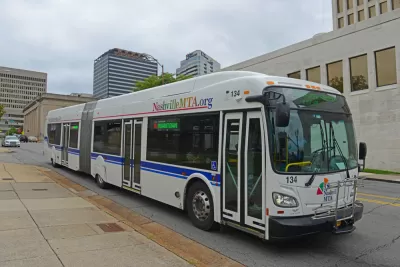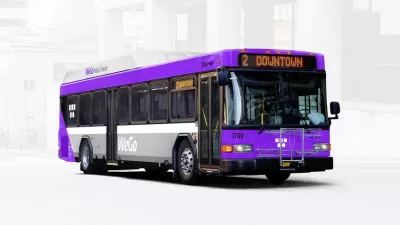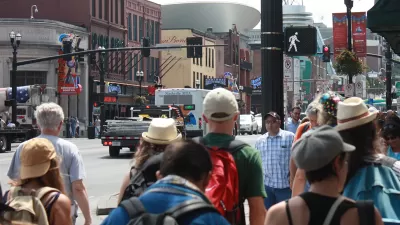The city of Nashville is trying to get back on track with some of the projects proposed in the 2016 nMotion plan—even without the massive pot of transit tax money it could have won at the ballot box.

"Metro officials hope an $18 million transit center will spark fresh activity in a part of town that has felt few ripples from Nashville's overall boom," reports Meg Garner in an article that might be blocked by a paywall for some readers.
Aaron Short provides additional, paywall-free coverage of the transit center plans, also providing background on the Let's Move Nashville transit funding referendum rejected by voters in May 2018. As noted by Short and Garner, the transit center is a part of the nMotion transit plan approved by Nashville region officials in 2016. In 2019, the transit center plans will rely on funding from the federal government.
Short describes the vision for the proposed transit center. "Once completed, the enclosed station would have up to four open-air bus bays with a climate-controlled passenger-waiting area, cyclist amenities and facilities conveying real-time locations of incoming buses, according to the MTA. Three bus routes now provide service through the location but the hub could provide connections for up to three more routes, including rapid bus services."
Short offers a lot more information on the political and planning context for the new proposal, as also recently provided by TransitCenter. Transit is tricky in Nashville—as more anecdotes than the failure of Let's Move Nashville prove. This past June, WeGo (née Nashville MTA) announced it would eliminate eight bus routes and raise fares from $1.70 to $2.

Maui's Vacation Rental Debate Turns Ugly
Verbal attacks, misinformation campaigns and fistfights plague a high-stakes debate to convert thousands of vacation rentals into long-term housing.

Planetizen Federal Action Tracker
A weekly monitor of how Trump’s orders and actions are impacting planners and planning in America.

San Francisco Suspends Traffic Calming Amidst Record Deaths
Citing “a challenging fiscal landscape,” the city will cease the program on the heels of 42 traffic deaths, including 24 pedestrians.

Defunct Pittsburgh Power Plant to Become Residential Tower
A decommissioned steam heat plant will be redeveloped into almost 100 affordable housing units.

Trump Prompts Restructuring of Transportation Research Board in “Unprecedented Overreach”
The TRB has eliminated more than half of its committees including those focused on climate, equity, and cities.

Amtrak Rolls Out New Orleans to Alabama “Mardi Gras” Train
The new service will operate morning and evening departures between Mobile and New Orleans.
Urban Design for Planners 1: Software Tools
This six-course series explores essential urban design concepts using open source software and equips planners with the tools they need to participate fully in the urban design process.
Planning for Universal Design
Learn the tools for implementing Universal Design in planning regulations.
Heyer Gruel & Associates PA
JM Goldson LLC
Custer County Colorado
City of Camden Redevelopment Agency
City of Astoria
Transportation Research & Education Center (TREC) at Portland State University
Jefferson Parish Government
Camden Redevelopment Agency
City of Claremont





























